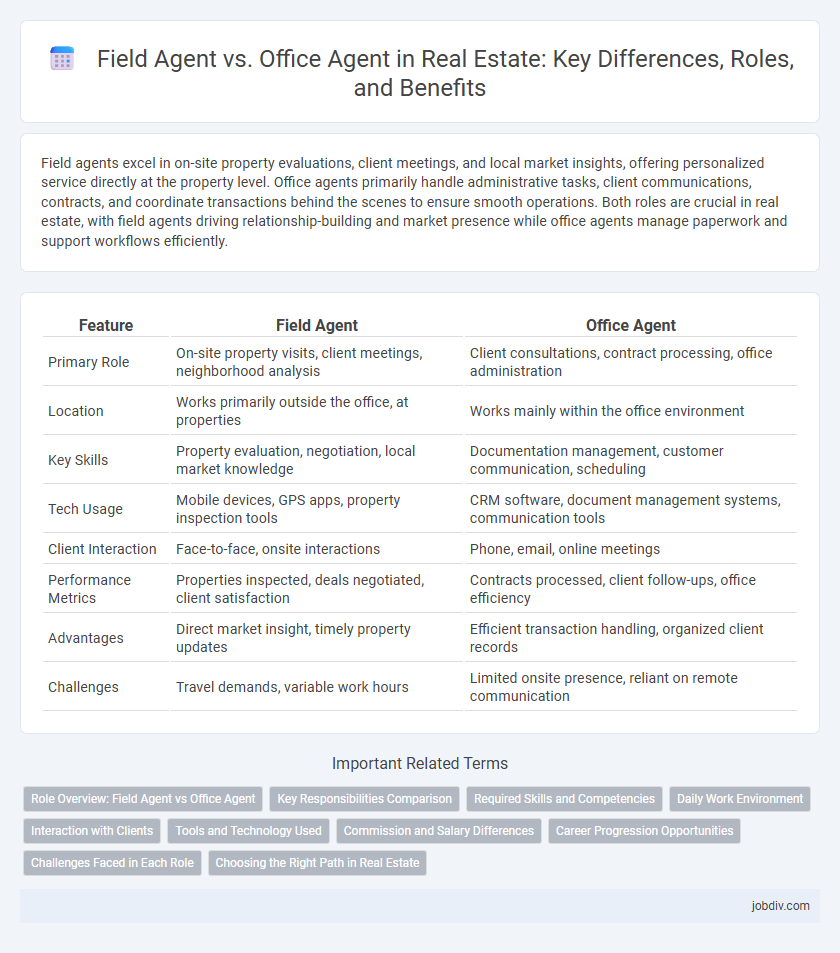Field agents excel in on-site property evaluations, client meetings, and local market insights, offering personalized service directly at the property level. Office agents primarily handle administrative tasks, client communications, contracts, and coordinate transactions behind the scenes to ensure smooth operations. Both roles are crucial in real estate, with field agents driving relationship-building and market presence while office agents manage paperwork and support workflows efficiently.
Table of Comparison
| Feature | Field Agent | Office Agent |
|---|---|---|
| Primary Role | On-site property visits, client meetings, neighborhood analysis | Client consultations, contract processing, office administration |
| Location | Works primarily outside the office, at properties | Works mainly within the office environment |
| Key Skills | Property evaluation, negotiation, local market knowledge | Documentation management, customer communication, scheduling |
| Tech Usage | Mobile devices, GPS apps, property inspection tools | CRM software, document management systems, communication tools |
| Client Interaction | Face-to-face, onsite interactions | Phone, email, online meetings |
| Performance Metrics | Properties inspected, deals negotiated, client satisfaction | Contracts processed, client follow-ups, office efficiency |
| Advantages | Direct market insight, timely property updates | Efficient transaction handling, organized client records |
| Challenges | Travel demands, variable work hours | Limited onsite presence, reliant on remote communication |
Role Overview: Field Agent vs Office Agent
Field agents in real estate prioritize on-site activities such as property inspections, client meetings, and local market analysis to directly engage with buyers and sellers. Office agents concentrate on administrative tasks including contract management, listing coordination, and client communications to support field operations. Together, these roles optimize transaction efficiency and client satisfaction throughout the property buying or selling process.
Key Responsibilities Comparison
Field agents are primarily responsible for conducting on-site property evaluations, attending open houses, and engaging directly with clients to gather market insights. Office agents focus on administrative tasks such as managing listings, coordinating schedules, processing contracts, and maintaining client databases. Both roles require strong communication skills but differ in their emphasis on fieldwork versus office-based coordination to facilitate real estate transactions effectively.
Required Skills and Competencies
Field agents in real estate require strong interpersonal skills, local market knowledge, and proficiency in property inspections and client negotiations. Office agents focus on administrative competencies, including contract management, marketing strategies, and CRM software familiarity. Both roles demand adaptability, attention to detail, and a thorough understanding of real estate regulations.
Daily Work Environment
Field agents in real estate engage directly with properties, conducting site visits, inspections, and client meetings outside the office, requiring robust time management and adaptability to varied locations. Office agents primarily handle administrative tasks, client communications, and marketing efforts within a structured office environment, relying heavily on digital tools and team collaboration. The daily work environment for field agents is dynamic and fast-paced with constant mobility, while office agents experience a more predictable, desk-centered routine focused on coordination and support functions.
Interaction with Clients
Field agents engage directly with clients through on-site visits, property tours, and neighborhood assessments, providing personalized and immediate insights. Office agents primarily interact via phone calls, emails, and virtual meetings, managing client queries and coordinating transactions efficiently from a centralized location. Client engagement differs as field agents emphasize face-to-face communication, while office agents leverage technology for remote support and administrative tasks.
Tools and Technology Used
Field agents utilize mobile apps, GPS tracking, and digital contract tools to conduct property tours, capture real-time data, and communicate on-site with clients. Office agents rely heavily on customer relationship management (CRM) software, virtual tour platforms, and advanced data analytics to manage client information and streamline property listings. Both roles leverage cloud-based solutions to enhance efficiency but differ in their primary technology focus tailored to their unique responsibilities.
Commission and Salary Differences
Field agents typically earn commissions based on property sales or leases, often benefiting from higher variable income tied to performance, while office agents receive a fixed salary with limited or no commission. Commission rates for field agents usually range from 3% to 6% of the transaction value, providing substantial earning potential in active markets. Conversely, office agents enjoy more stable income through consistent salaries but generally have less opportunity to exceed average earnings compared to their field counterparts.
Career Progression Opportunities
Field agents gain hands-on experience in property showings and client interactions, building a strong foundation in sales and market knowledge. Office agents typically advance into managerial roles, overseeing operations and coordinating teams, which broadens leadership skills and strategic planning expertise. Career progression for field agents often involves transitioning to office-based positions, enabling growth in responsibility and income potential within the real estate sector.
Challenges Faced in Each Role
Field agents encounter challenges such as maintaining effective communication with clients and office staff while managing multiple property showings, inspections, and onsite negotiations. Office agents face difficulties in staying updated on market trends, coordinating team activities, and handling administrative tasks that ensure smooth transaction processing. Both roles demand adaptability to fluctuating market conditions and high-pressure environments to meet client expectations efficiently.
Choosing the Right Path in Real Estate
Field agents excel in client interactions and property showings, driving sales through direct market engagement and local expertise. Office agents manage listings, coordinate transactions, and handle administrative tasks to ensure smooth operations behind the scenes. Selecting the right path depends on whether you prefer dynamic client-facing roles or strategic office management within real estate.
Field Agent vs Office Agent Infographic

 jobdiv.com
jobdiv.com